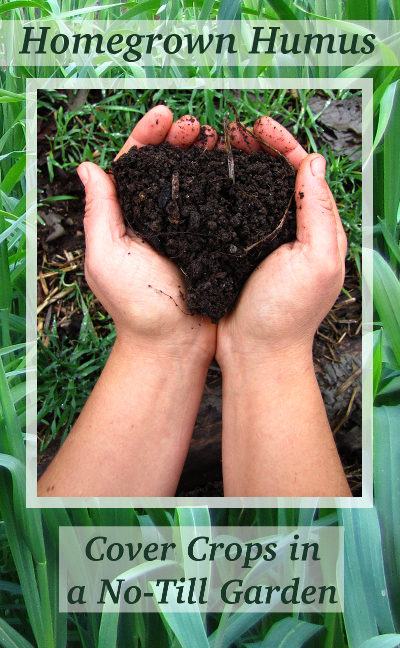
Homegrown Humus
 It's been raining and raining
and raining, so I've huddled inside writing up (and through) a
storm. My root
cellar ebook still
needs a bit more data and photos, but a quick overview of using cover
crops in no-till gardens really wanted to see the light of day
immediately.
It's been raining and raining
and raining, so I've huddled inside writing up (and through) a
storm. My root
cellar ebook still
needs a bit more data and photos, but a quick overview of using cover
crops in no-till gardens really wanted to see the light of day
immediately.
Homegrown
Humus: Cover Crops in a No-till Garden probably won't give you much
new information if you've been reading my experiments here on the blog, but it
might be worth 99 cents to have all of the data summed up in one
place. I'm hoping the ebook will inspire folks to see how easy it
is to boost their organic matter levels in a no-till garden.
Here's the blurb:
Cover crops are a simple, cheap way to boost your soil's organic matter, to fight weeds, to prevent erosion, to attract pollinators, and to keep the ecosystem in balance. Unfortunately, most information on growing cover crops is written for people who plow their soil every year and are willing to spray herbicides. You can get all of the same benefits in a no-till garden, though, if you're clever.
Homegrown Humus details three no-till winners in depth --- buckwheat, oilseed radishes, and oats. Profiles of other species suggest gardening conditions when you might want to try out sunflowers, annual ryegrass, barley, rye, Austrian winter peas, crimson clover, or cowpeas as well.
Meanwhile, the book delves into finding cover crop seeds, planting cover crops in a no-till garden, and easily killing cover crops without tilling or herbicide use. Understanding the C:N ratio of cover crops helps determine how long to wait between killing cover crops and planting vegetables, as well as how to maximize the amount of humus you're adding to your soil.
Cover crops are an advanced gardening technique bound to increase your vegetable yields, but are simple enough for beginners. Give your garden a treat --- grow some buckwheat!
Next week, I'll post
excerpts as a lunchtime series. To read the rest,
you'll need to splurge
99 cents on the ebook (which can
be read on
nearly any device),
or wait until next Friday when I'm setting the price to
free so that my loyal readers can pick up a copy without paying.
Those of you who prefer a pdf copy can email me next Friday as well and
I'll
send your free copy that way instead. Thanks for reading (and
double thanks if you find the time to leave a review on Amazon)!
It's your glowing reviews of Trailersteading that inspired me to
whip out this ebook so quickly.
Want more in-depth information? Browse through our books.
Or explore more posts by date or by subject.
About us: Anna Hess and Mark Hamilton spent over a decade living self-sufficiently in the mountains of Virginia before moving north to start over from scratch in the foothills of Ohio. They've experimented with permaculture, no-till gardening, trailersteading, home-based microbusinesses and much more, writing about their adventures in both blogs and books.
Want to be notified when new comments are posted on this page? Click on the RSS button after you add a comment to subscribe to the comment feed, or simply check the box beside "email replies to me" while writing your comment.
- Remove comment
- Remove comment
